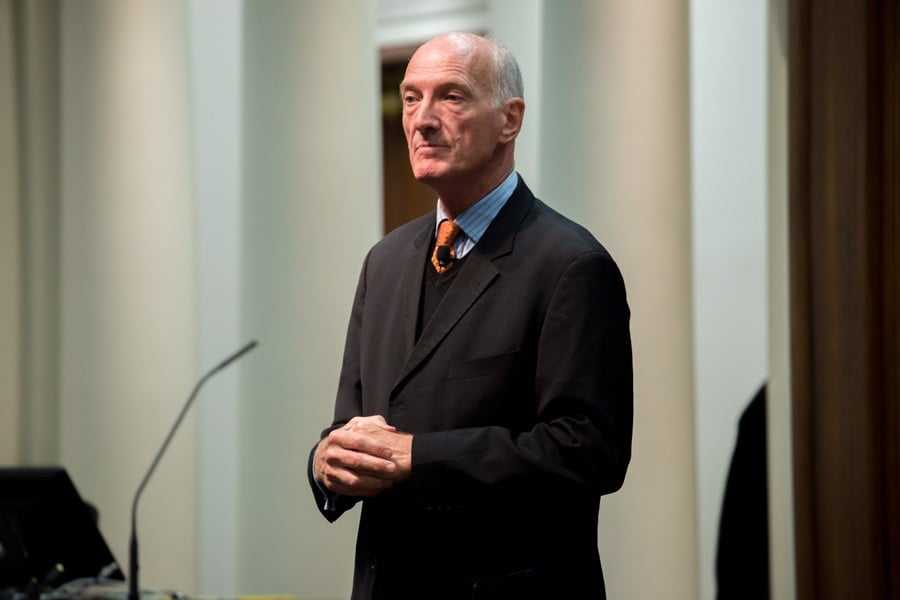South African Justice discusses law, civil rights in a post-apartheid society
Zack Laurence/The Daily Northwestern
South African Justice Edwin Cameron discusses establishing equality in a post-apartheid society. Cameron spoke as part of a week-long visit to Northwestern.
January 21, 2016
The law can be both a force to liberate and a force to oppress, South African Constitutional Court Justice Edwin Cameron said Wednesday, calling on Northwestern students to be forces of progress.
Cameron spoke to about 250 students, faculty and Evanston community members at Harris Hall as part of a six-day visit to NU. Invited by Medill Dean Brad Hamm, Cameron discussed the roles of law and citizens in establishing racial, sexual and health justice, drawing from his experience serving in the South African legal system.
Though law may have a basis in justice, it does not always lead to justice, Cameron said, referencing South Africa’s apartheid past. He spoke on how Nelson Mandela, who swore to defend South African law as a lawyer, encouraged disobedience to promote justice against apartheid. The high court, recognizing the value of Mandela’s actions, overturned unjust laws in response.
“The paradox … is that to use a legal system it has to have some conception of justice to it,” Cameron said. “Amidst the massive injustice of the system, there was still a conception that Mandela never forgot, that the law was designed not to suppress and subordinate and degrade, but the law was in fact designed for something quite different.”
Cameron also discussed the limits of the law and the necessity for civic engagement in inciting change. He invoked the history of the HIV epidemic in South Africa, where civil protest in tandem with legal action brought about the reversal of the country’s policy restricting HIV treatment. South Africa now has an exemplary system for making antiretroviral drugs accessible for those who most need it, he said.
“It’s a remarkable story,” Cameron said. “It’s a story I told because of its importance in understanding what confronting prejudice and stigma and fear can do, and also what the law and activists can do.”
Continuously referencing his own experiences, Cameron recognized the many ways different parts of his identity influenced his life. As the first openly gay and HIV-positive man to serve on the South African Constitutional Court, he discussed how he advocated for legal protection of LGBT rights.
“I was involved in trying to get sexual orientation into the constitution and I was a gay man,” Cameron said. “At the time that I started my human rights practice in Johannesburg, I determined I would not apologize for something that was constitutive of my human soul.”
Cameron has frequently worked with the Medill School of Journalism, Media, Integrated Marketing Communications’ South Africa Journalism Residency program. His visit to campus was an outgrowth of that relationship, said Medill Prof. Douglas Foster, who oversees the program.
Foster cited Cameron’s unique perspective on human rights both in South Africa and the United States as well as his accolades, which include being recognized by Mandela as a “new hero” of South Africa. The professor, who has worked closely with Cameron in the past, told The Daily he has long admired the justice’s perspective.
“He’s somebody who’s thought deeply about how you create communities of people who can cross lines of culture, language, race, background,” Foster said. “Because that’s what the South African experiment is about.”
University President Morton Schapiro, who also attended the event, told The Daily he admired Cameron’s candidness and courage.
“He’s a wonderful speaker,” Schapiro said. “The way he tells such a deeply personal story for somebody who’s such a prominent figure in his country, I find deeply inspiring.”
Email: [email protected]
Twitter: @matthewchoi2018


